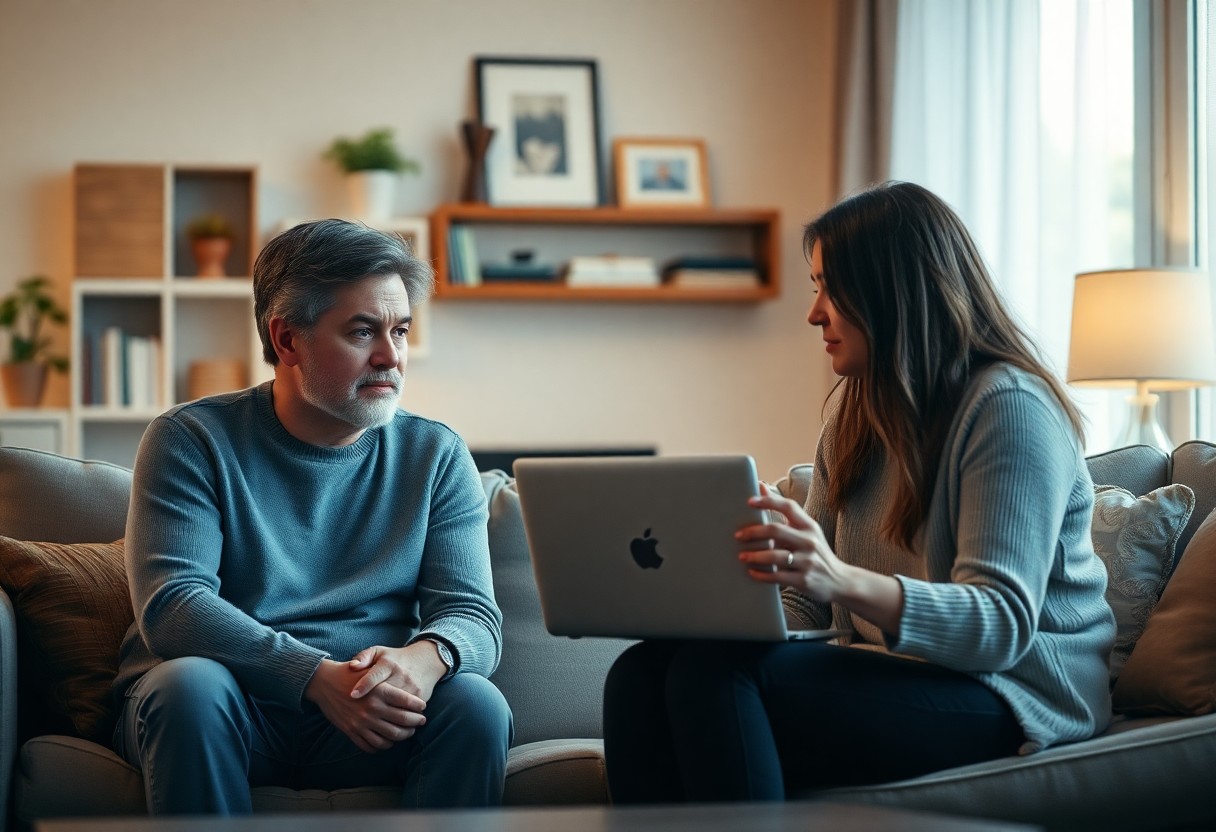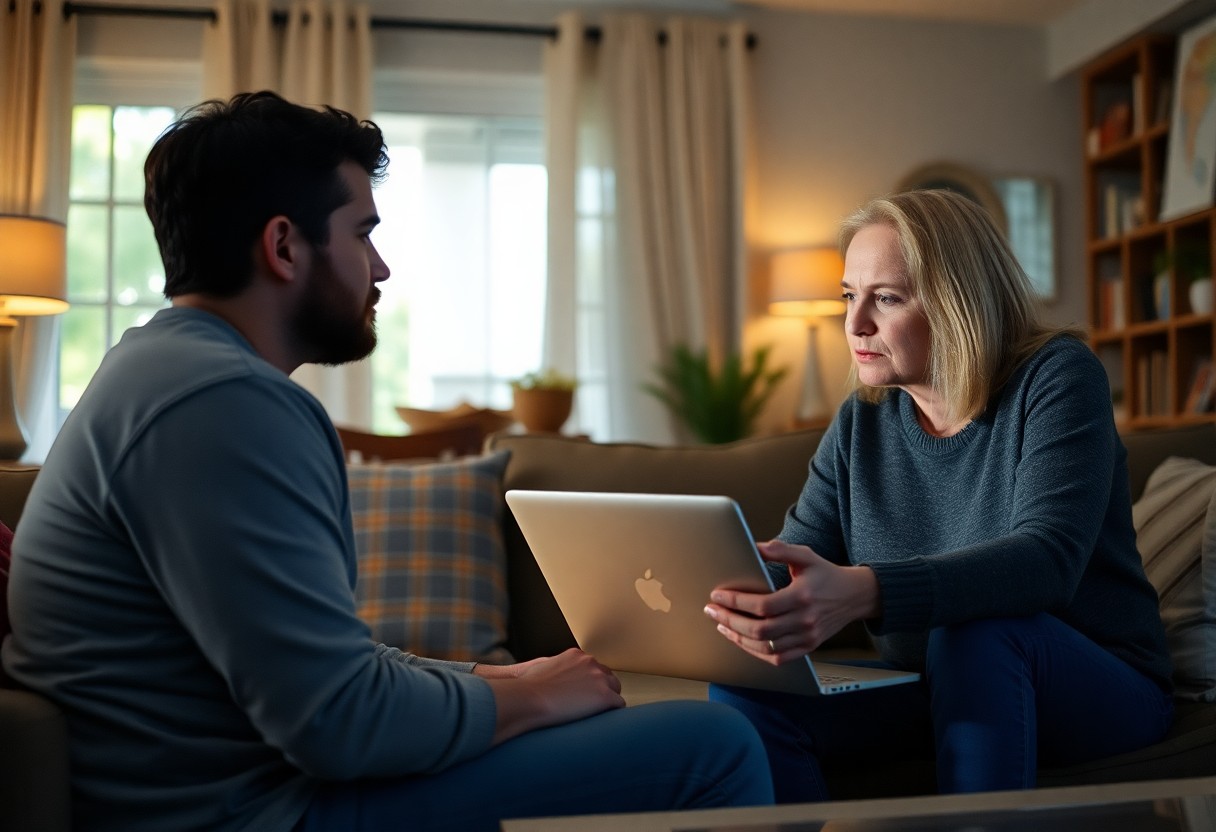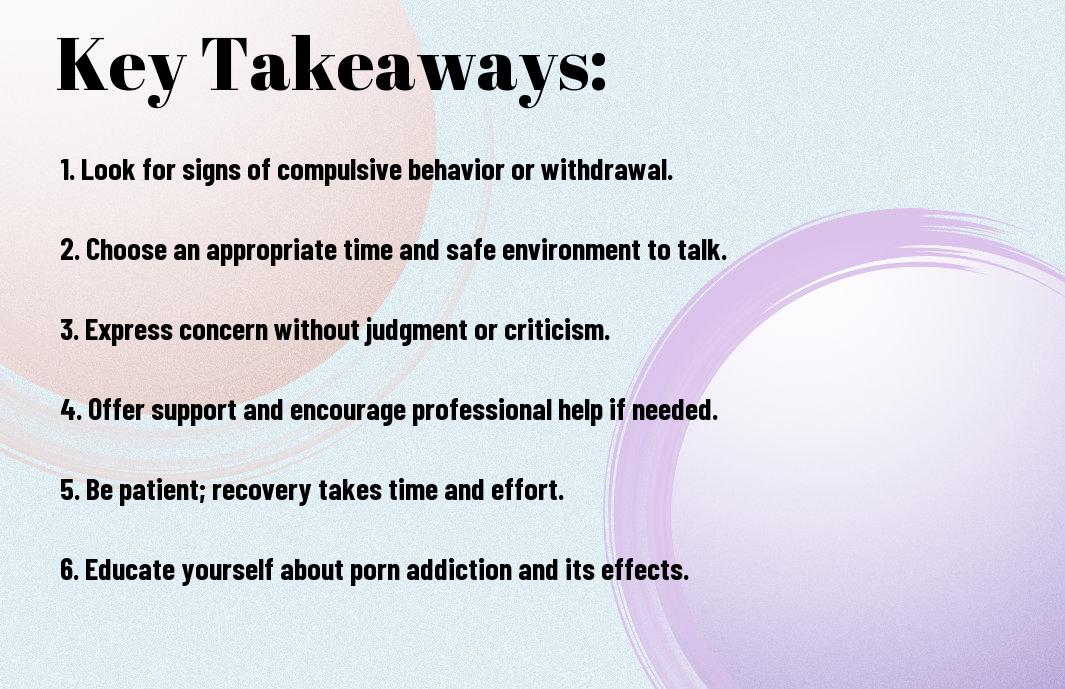Many people struggle with porn addiction, and understanding when to intervene can be challenging. Recognizing the signs that a loved one may be facing this issue is important for providing effective support. In this blog post, you’ll learn about the indicators of porn addiction, the best approaches for initiating a conversation, and how to offer your help in a constructive way. By educating yourself on this topic, you can play an important role in guiding someone toward healthier choices and behaviors.
Key Takeaways:
- Recognize the signs of porn addiction, such as excessive use, emotional distress, or negative impact on relationships and responsibilities.
- Choose an appropriate time and setting to approach the individual, ensuring privacy and a comfortable environment for an open conversation.
- Express concern with empathy and understanding rather than judgment, highlighting your support in their journey to overcome the addiction.
- Encourage professional help if necessary, including therapy or support groups, while offering to assist them in finding resources.
- Be patient and prepared for resistance, as change takes time, and maintaining an open line of communication is key throughout the process.

Understanding Porn Addiction
While porn addiction is often misunderstood, it is a behavioral issue that can significantly impact one’s life. It involves compulsive use of pornography despite negative consequences, which may affect relationships, work, and mental health. Understanding this addiction is vital for anyone looking to support a friend or loved one, as it presents unique challenges and requires compassionate intervention.
Definition and Overview
Before delving deeper, it’s crucial to recognize that porn addiction is characterized by an overwhelming preoccupation with pornographic material, leading to a loss of control over sexual impulses. This addiction can manifest in various ways, impacting everyday life, emotional well-being, and personal relationships, often leaving individuals feeling isolated and ashamed.
Signs and Symptoms
Above all, recognizing the signs and symptoms of porn addiction helps you identify if someone is struggling. Common indicators include spending excessive time viewing pornography, using it as a coping mechanism for stress or loneliness, and experiencing adverse effects in personal and professional relationships.
For instance, you might notice that the individual frequently withdraws from social interactions, prioritizing porn consumption over real-life connections. Additionally, they may exhibit changes in mood, such as irritability when unable to access porn or an overall decline in emotional well-being. Other signs include neglecting responsibilities, experiencing a lack of interest in sexual intimacy, or feeling guilt and shame following porn use. These symptoms indicate that the person may be grappling with an addiction that needs appropriate support and intervention.

Assessing the Need for Intervention
Some signs may indicate that a loved one is struggling with a porn addiction. You might notice changes in their behavior, emotional state, or relationships. To better understand this issue, you can explore resources on Pornography Addiction. Evaluating these signs can help you determine if an intervention is necessary and how best to approach the situation with empathy and care.
Recognizing the Severity
Need to understand the severity of the addiction to determine the appropriateness of your intervention. Look for indicators that their engagement with pornography is negatively impacting their life—such as neglecting responsibilities, experiencing relationship issues, or feelings of shame or guilt. Open conversations can reveal the extent of the problem and whether professional help may be required.
Timing of Intervention
Across situations, the timing of your intervention can significantly influence its effectiveness. If you notice that their behavior is worsening or they express feelings of distress related to their porn use, it might be the right time to speak up. Timing your intervention thoughtfully can lead to a more receptive attitude and a willingness to explore help.
For instance, selecting a calm moment when your loved one is not preoccupied with their addiction can create a more open environment for discussion. Being mindful of their emotional state and finding the right moment to approach them can facilitate a more productive conversation. You may want to gently express your concerns, emphasizing your support and the path towards recovery rather than casting blame.
Preparing for the Conversation
Your approach to discussing a porn addiction requires thoughtful preparation. It’s important to gather your thoughts and outline your concerns clearly but compassionately. This ensures that the dialogue remains constructive. Reflect on your motivations for assisting them and be ready to listen actively. Crafting an empathetic tone will likely enhance the chances of a productive conversation.
Choosing the Right Setting
Across various environments, the setting for your conversation can significantly influence its outcome. Opt for a private, comfortable space where the person can feel secure and not judged. This choice fosters openness, encouraging honest dialogue free from distractions. A calm and uninterrupted setting implies your respect for their feelings and enhances receptiveness to your concerns.
Developing Empathy and Support
Empathy plays a transformative role when discussing sensitive topics like porn addiction. Understanding their perspective allows you to connect on a deeper level, helping to dismantle feelings of shame or defensiveness. Approach them with compassion and an open heart, ensuring they know your intention is to offer help, not to criticize. By being supportive and acknowledging their struggles, you empower them to engage in this conversation more earnestly.
Indeed, creating an environment of empathy involves actively listening and validating their feelings. Acknowledge that addiction can stem from various emotional states like loneliness or stress. Encourage their self-reflection and emphasize that seeking help is a sign of strength rather than weakness. Your support should focus on understanding their challenges and fostering a collaborative effort to find solutions together.

Approaching the Individual
Now that you’ve decided to intervene, it’s necessary to approach the individual with care and sensitivity. Choose a private, comfortable setting where they feel secure, as this fosters an openness for discussion. Your goal is to express concern without judgment, emphasizing that your intention is to support rather than criticize. This is a delicate subject, so be prepared for a range of emotions and reactions as they process the conversation.
Communication Strategies
An effective way to communicate your concerns is to use “I” statements. For instance, avoid saying, “You have a problem,” and instead express, “I’ve noticed you seem unhappy lately.” This approach reduces defensiveness and opens a doorway for dialogue. Maintain a calm demeanor, and be patient, allowing them to share their feelings and thoughts without interruption.
Active Listening Techniques
Approaching the conversation with active listening is necessary for facilitating understanding and connection between you and the individual. Show that you genuinely care by giving them your full attention and reflecting back what they say, which demonstrates that you value their perspective.
Indeed, active listening is more than just hearing words; it involves engaging with the speaker both verbally and non-verbally. Use body language, such as nodding and maintaining eye contact, to show you’re engaged. Reflect on what they share by paraphrasing their feelings or summarizing key points, helping them feel validated. Ask open-ended questions that encourage them to research deeper into their thoughts and feelings. This nurturing environment can greatly facilitate a more in-depth conversation around their addiction and the challenges they face.
Resources for Recovery
Not all resources for recovery are created equal, and it’s important to explore various options tailored to individual needs. From professional therapists specializing in addiction to online forums where you can share experiences, there’s a wealth of information available. Engaging with structured programs or self-help materials can significantly support the recovery journey. Ultimately, choosing the right fit for you can enhance the healing process and promote lasting change.
Professional Help
Before begining on the journey of recovery from porn addiction, seeking professional help can provide you with the expert guidance necessary for navigating complex emotions and behaviors. Licensed therapists or counselors often employ evidence-based treatments tailored to your unique circumstances, fostering a safe environment to address underlying issues and triggers. They can also offer practical tools and coping strategies to help manage urges and prevent relapse.
Support Groups and Communities
Professional support systems can greatly benefit your recovery by offering a sense of belonging. You’ll find that connecting with others who share similar experiences can provide encouragement and understanding, fostering a safe space for open discussions and shared coping strategies. Many groups, both online and in-person, encourage trust and anonymity, allowing you to express your challenges freely. This peer support can empower you to maintain accountability, celebrate small victories, and reinforce healthy habits during your recovery process.
This communal aspect can play a pivotal role in your journey toward recovery, alleviating feelings of isolation that often accompany addiction. Many support groups follow structured programs, like the 12-step model, focusing on personal growth and development alongside accountability. By participating actively, you will not only gain insights and resources from others but also contribute your own experiences, enriching the group dynamic and reinforcing your commitment to change.
Supporting Long-Term Recovery
For individuals recovering from a porn addiction, your ongoing support can make a significant difference. Encourage them to explore resources like Getting Help for a Porn Addiction, which can provide strategies and tools for maintaining their recovery over time.
Encouraging Healthy Habits
Among the best ways to support someone in their recovery is to help them build healthy habits. Encourage activities that promote well-being, such as regular exercise, mindfulness practices, and engaging in hobbies. These positive habits can foster a more balanced lifestyle and reduce the temptation to relapse.
Maintaining Open Communication
Below this supportive foundation lies the importance of maintaining open communication. Be approachable and non-judgmental, allowing your loved one to express their feelings and challenges freely. This openness can create a safe space for vulnerability, fostering trust and understanding in your relationship.
Long-term recovery requires ongoing dialogue about feelings and experiences related to the addiction. Check in regularly to discuss their progress and any challenges they may face. A supportive conversation can promote accountability and reinforce their commitment to recovery. Your willingness to engage in these discussions can help them navigate their path more effectively, while also demonstrating that they are not alone in their journey.

Final Words
Drawing together the insights on how to help someone with a porn addiction, you should intervene when you notice patterns of isolation, neglect, or emotional distress tied to their behavior. Approach the situation with empathy and openness, creating a safe space for dialogue. Your support can be transformative, so encourage professional help if necessary, and be prepared to listen without judgment. By understanding the signs and being proactive, you can play a significant role in their recovery journey.
FAQ
Q: What are the signs that someone may have a porn addiction?
A: Signs of a potential porn addiction can include spending excessive amounts of time viewing pornography, neglecting responsibilities or relationships, experiencing withdrawal symptoms when not viewing, and using porn as a primary source of sexual gratification. Additionally, one might notice increased secrecy about online habits and an inability to control or reduce consumption despite wanting to do so.
Q: How can I approach someone I suspect has a porn addiction?
A: Approaching someone about a sensitive issue like porn addiction requires care and compassion. Start by choosing a private and comfortable setting to have an open conversation. Use “I” statements to express your concerns, such as “I’ve noticed that you seem distant lately, and I want to check in on how you’re feeling.” Be sure to listen to their perspective and avoid judgmental language.
Q: When is the right time to intervene?
A: The right time to intervene is when you notice that the individual’s pornography consumption is negatively impacting their life. This can include issues in their relationships, performance at work or school, mental health decline, or neglect of personal hygiene. If you observe multiple signs of distress or dysfunction, it may be time to have a conversation.
Q: What resources can I recommend to someone battling porn addiction?
A: There are various resources available, including online support groups, therapy focused on addiction, and self-help books. Websites such as NoFap and Fight the New Drug provide educational materials and community support. Encourage them to seek professional help from a counselor or therapist who specializes in addiction issues.
Q: How should I support someone during their recovery from porn addiction?
A: Supporting someone in recovery involves being understanding and patient. Encourage open communication and validate their feelings without judgment. Help them to set realistic goals and celebrate their progress, no matter how small. Additionally, offer to participate in healthy activities together that can serve to fill the time they may have previously spent on pornography.
Q: What if the person denies they have a problem?
A: If the person denies having a problem, it’s important to respect their feelings while expressing your concerns. Avoid confrontational tactics; instead, share specific behaviors you’ve observed and emphasize your care for their wellbeing. It may take time for them to acknowledge an issue, so be patient and available for support if they decide to revisit the topic later.
Q: Can I help someone with a porn addiction on my own, or do they need professional help?
A: While your support can be valuable, professional help is often necessary for effective recovery from a porn addiction. Therapists can provide tailored strategies and coping mechanisms that friends and family may not be equipped to offer. Encourage the individual to seek professional guidance while maintaining your supportive role as needed. This collaborative approach can enhance their chances of recovery.
